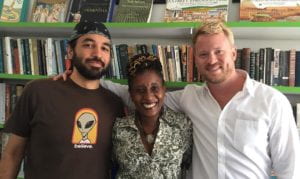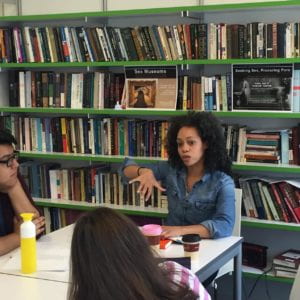By Gina Elbert
Last spring during registration, students may have noticed a new two-credit course on the English Department webpage: the Contemporary Literature Series Lab, taught by Professor Nicholas Boggs. Students who participated in or attended Contemporary Literature Series events in the past might have guessed that the lab was an expansion of the CLS program, and they wouldn’t have been far off. The CLS Lab is a new course that works to bring authors of all kinds into the classroom to speak with students interested in contemporary literature and careers in English-related fields. The eight or so students who are chosen to participate – they must apply by submitting a paragraph detailing their interests – gain insight into their potential futures, make connections within the English department and the greater literary world, and acquire experience working with literary arts organizations.

The CLS Lab meets ten times throughout the semester, each time with a different assigned reading and a new class visitor. So far this semester, the students in the lab have been graced by the presence of poets Malika Booker and Keith Wilson, poet and novelist Alan Michael Parker, poet Nicole Terez Dutton, and Caroline Crumpacker, a poet and director of the Millay Colony for the Arts. Featured authors participate in literary events both on and off campus. Malika Booker and Keith Wilson gave a reading at Cave Canem, a literary service organization based in Brooklyn that celebrates African-American poetry. Next semester, featured author John Keene will hold a reading and talk with Professor Phillip Brian Harper and Professor Sonya Posmentier at the Humanities Center on Cooper Square in March 2017. Students are asked to prepare questions for each week’s author and to attend at least two readings over the course of the semester. They also write up pre- and post-event reports, incorporating information and quotations garnered during both the class visits and the public events.
As a student in the CLS Lab, I personally find the experience rewarding and exciting. The small-group atmosphere facilitates discussion that is at once relaxed and passionate. Every student works hard to prepare to meet new authors and to read their work, and then to write accounts of their visits. Although some of the students in the lab are also CLS Fellows, not all fellows are in the lab. Through this mix of students, the lab can draw on the experience of returning fellows but also remain open to new perspectives.
Professor Nicholas Boggs, who is the Director of Undergraduate Research and Advisement as well as the faculty coordinator of both the new creative writing track and CLS, maintains close ties with his students and creates a comfortable atmosphere in the lab so students can get to know each other. He supports their literary pursuits outside the classroom (like publishing in the campus literary magazine, Minetta Review), and he encourages students to pursue opportunities like interning at the Millay Colony for the Arts, an artists’ colony in upstate New York where he serves on the board of directors. When asked about the future of CLS Lab, Professor Boggs said, “After this first successful iteration of the lab, we are particularly excited about integrating student-led podcasts with visiting authors into the CLS Lab experience in the future. This semester, students in my course, ‘Reading as a Writer,’ produced a podcast about National Book Award in Poetry Finalist Solmaz Sharif, who visited the class as part of CLS. That podcast will soon be up on the CLS website. The success of this podcast by our students has provided a model for future semesters featuring a more extensive line-up of podcasts that allow students to further build their skills in literary arts media.”

The next time the CLS Lab will be offered as a course will be in the fall of 2017. The curriculum has yet to be finalized, but it is likely that the lab will be organized around the journal Transition’s special section on James Baldwin, co-edited by Professor Boggs and Nicole Terez Dutton, forthcoming in 2018. The editors of Transition, which operates out of Harvard University, describe it as a “publication at the intellectual crossroads of the new black world.” Professor Boggs and Dutton plan to celebrate author James Baldwin and explore the implications of his writing for thinking about race, art, and politics today. CLS Lab students will meet several authors who will be writing about Baldwin for the journal’s special section and assist in the journal’s online expansion of this exciting Baldwin project.